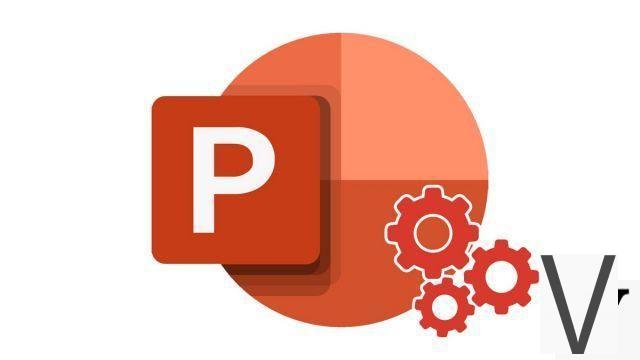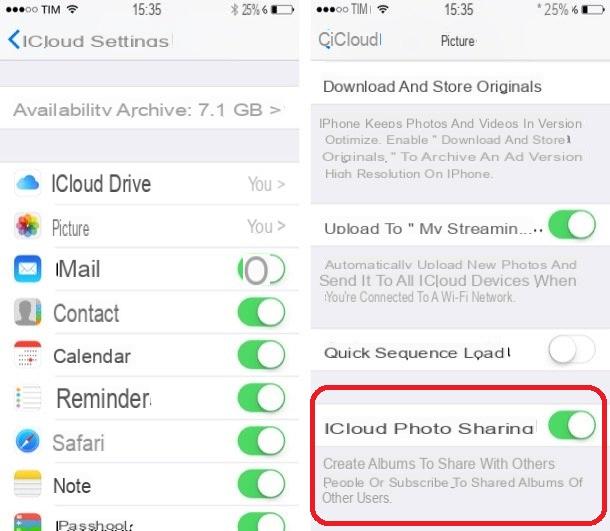
Much like the transition from CDs to streaming music, the habit of keeping files locally on your laptop or on an external USB drive is being replaced by cloud storage.
There is no need to store documents on your computer while putting them in the cloud makes it easier to access them on all your devices, including your phone. There are also other advantages: you can send a link to your friends, family or colleagues so that they can access specific files or folders, without having to attach these files via email. Likewise you can share much larger files than email can handle, let alone videos.
Even better, with online storage you don't have to worry about running out of space or losing files, just pay for more storage and the provider takes care of keeping your files safe.
Cloud services do not offer all these features and not all offer the same level of security for your files. And, that's why you're here; you want to know which is the best service to use. We explain the pros and cons of all the major Clouds on the market, and some you may not have heard of before.
Online storage with local copies of files
If the idea of storing your files on just a cloud makes you a little uncomfortable, know that most work so that there is a local copy of all the files on your laptop, PC or Mac, for convenience.
On phones and devices with limited storage space, you can usually indicate needing to be locally available.
Is the Cloud a form of backup?
This is a very important point, the services we have selected in this article work by synchronization. Therefore, when you delete the local copy of a file, the cloud version is also deleted. And vice versa.
Cloud storage is therefore not necessarily a backup.
What is the best Cloud?
With so many services on the market, it is not easy to find your account. But that's where we've sifted through all the cloud offerings, and selected 10 that we consider to be the best. They will allow you to save your files, photos, videos, music and other important data, without taking up space on your smartphone, tablet or PC.
Most offer free trials or plans, so you can try them out before you hit the wallet.
1Google Drive - Best of all
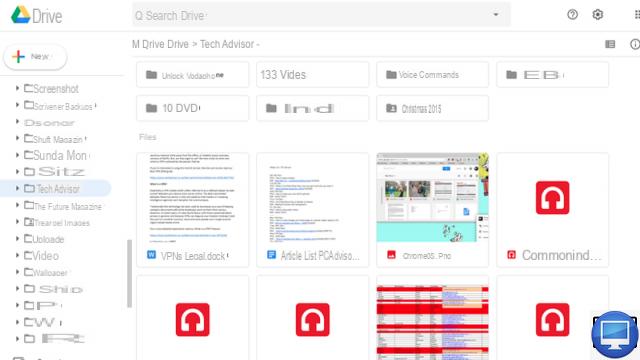
- Most
- 15 GB of free storage
- Online office applications
- The lessers
- No end-to-end encryption
- Indicated price:
If you have a Google account, you already have 15 GB of free storage in Google Drive. You can use it to back up documents, photos, videos, and anything else you want to keep safe.
Drive's interface is simple and clear, and it takes about two minutes to master. It's not that basic though, as Drive has some useful features like sharing links to folders (while setting the recipient's level of control), accessing a file even if it's open on another device, as well as apps for PC, Mac, iOS and Android.
One of Drive's real benefits is that it works seamlessly with Google's free suite of office apps, which you can use in a web browser or through apps on your phone and tablet.
If that 15GB isn't enough, then subscribe to Google One.
Best of all, Google One can be shared by up to five family members.
Conclusion : Google Drive is an excellent, reliable and affordable cloud storage service.
2Microsoft OneDrive - Best for Windows and Office Users
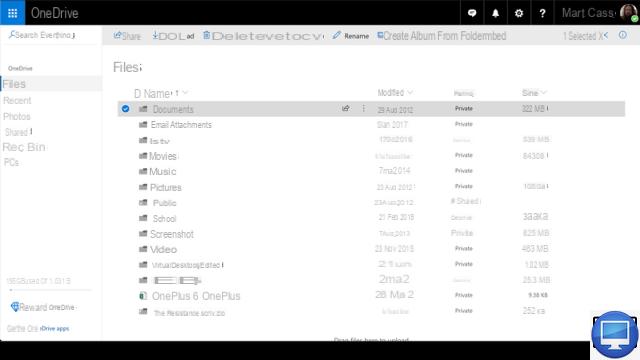
- Most
- Integration with Microsoft services
- Can free up space on your devices
- The lessers
- Only 5 GB of free space
- Indicated price:
The cloud storage service seamlessly integrated into Windows 10 is Microsoft's OneDrive. Although the initial 5GB free tier fills up quickly, it's still comparable to many other services.
Features include automatic photo backups, advanced search capabilities, mobile and web access to OneDrive, and Files On-Demand settings that keep files stored only online rather than occupying space on your device.
This comes with a number of extras such as restoring the entire disk to any time in the last 30 days, ransomware detection, password protection of shared files, backup dates expiration of shared links, offline folders on mobile devices, and ten times the allowed amount of content that can be shared each day.
Conclusion : If you already use Windows 10 and Microsoft Office, or plan to do so, then OneDrive is the obvious choice for storage.
3pCloud - Best for Lifetime Plans
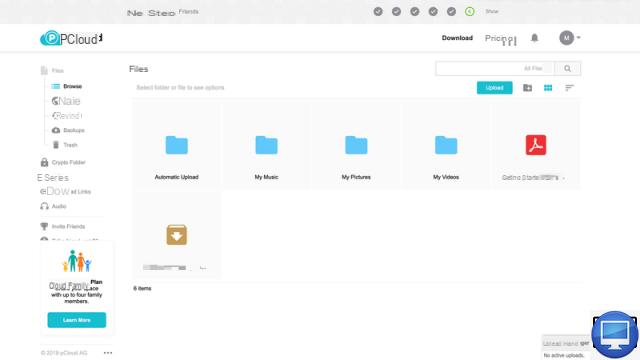
- Most
- Value-for-money lifetime plans
- 10 GB of free storage space
- The lessers
- Additional charges for end-to-end encryption
- Indicated price:
pCloud doesn't have the office suites, video content, or other extras offered by companies like Google, Microsoft, and Amazon. Instead, the Swiss company sticks to what it does best: keep your files safe and available on all your devices.
The free tier gives you 10GB of storage, but 3GB must be unlocked by performing tasks such as downloading the mobile app, uploading a file, or sharing the service with friends.
There are no file size restrictions, so you can upload whatever your storage space allows, and versioning means files can be restored back up to 30 days.
Security is strong, with pCloud claiming that it keeps five copies of each file, spread across different servers, with 256-bit AES encryption applied on the servers.
Conclusion : pCloud is a stable and fast storage service with optional encryption. The lifetime price makes it a good value.
4Mega - With the most free storage space and encryption
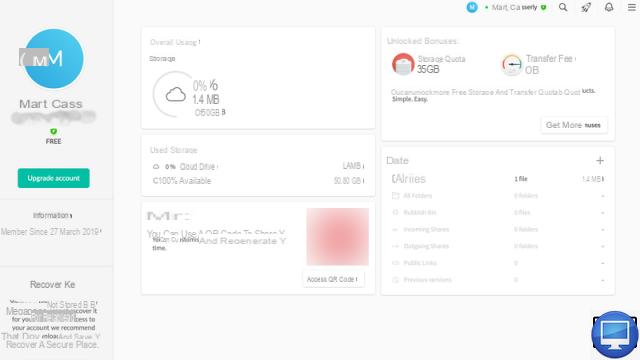
- Most
- Over 15 GB of free storage
- End-to-end encryption
- The lessers
- No longer offers 50 GB of space
- Indicated price:
New Zealand-based Mega has previously offered 50GB to new users, but that offer has been increased to 20GB, with the extra capacity being rewarded with what Mega calls "targets".
These include confirming your account, installing Mega apps, and inviting friends to use the service. The situation is further complicated by the fact that bonus storage is different for each objective and is only temporary, with expiration dates ranging from 30 days to one year.
Mega's main selling point is security, with end-to-end encryption that protects your files even as they travel between your device and its servers. The key to this encryption is your password (not to be lost) which means that even Mega cannot access your data. If you lose it, you won't be able to access those encrypted files either.
The service offers extensions for Chrome and Firefox, secure chat with other Mega users, and an email add-on for Thunderbird for easily and securely exchanging large files.
Conclusion : Fast, easy to use and good value for money if you need to store a lot of data in the cloud.
5sync.com
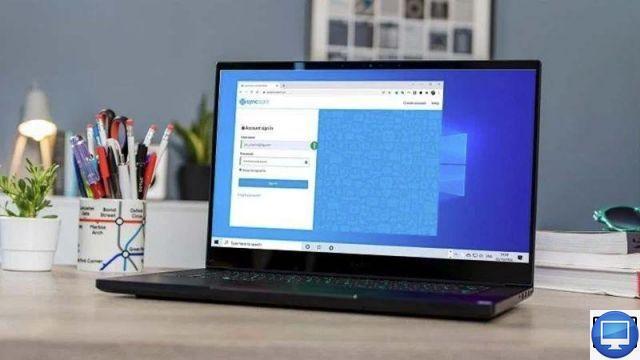
- Most
- End-to-end encryption
- Excellent sharing options
- The lessers
- Limited choice of paid subscriptions
- Limited support for personal subscriptions
- Indicated price:
Sync.com is based in Canada and offers subscriptions for individuals and businesses. It is a "zero knowledge" platform, which means data is encrypted on your own device before being uploaded to the cloud, where it remains encrypted.
One of its disadvantages is the limited choice of paid plans. Sync offers 5GB for free, but the cheapest paid subscription is 2TB (Pro Solo Basic), and there's nothing in between. However, the price is very reasonable at $8/month (or €7) but note that the payment is annual, not monthly.
You can sync files from your device to the cloud and you have apps available for Windows, macOS, Android, and iOS. If you want to save space locally, specify which files only exist in the cloud and which are also available on the device itself.
The mobile apps will automatically download photos and videos and allow previewing of Office documents and PDFs in the apps and on the web version.
If you opt for Solo Basic, you have 180 days of history to delete files and access previous versions.
For sharing files in the cloud, you have many options available such as password protection of links and progressive permissions to limit access to document viewing, for example.
Unlike Teams plans, individual subscribers get limited support, but if you're willing to accept VIP email support then Sync.com should be right up your alley.
6Dropbox - At the best compatibility
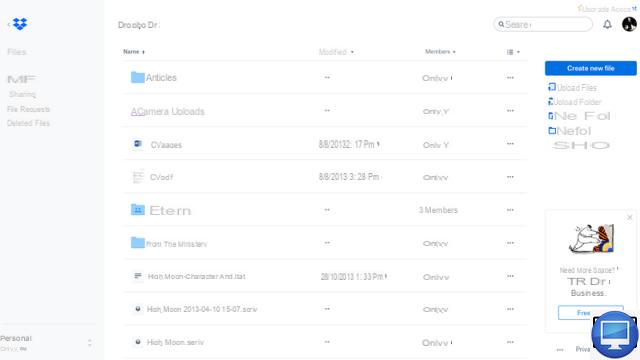
- Most
- Works with many other apps and services
- Good for business
- The lessers
- Only 2 GB offered
- Indicated price:
Dropbox is one of the biggest names in cloud storage. Today, it has evolved into a business-oriented service with powerful tools such as the ability to collaborate on PowerPoint and Photoshop files in real time, create team plans on its own Paper platform, and more.
Massive third-party app support, plus Windows and macOS integration make Dropbox a solid choice.
Individual users face a greater dilemma, with the free tier offering 2GB of space, limited to three devices, and suffering from a lack of even the most basic features, such as setting access permissions to a shared file.
Conclusion : For small teams and businesses, Dropbox has a lot to offer. We also recommend it for individuals who need 2 to 3 TB of storage.
7Apple iCloud - Best for iOS and macOS users
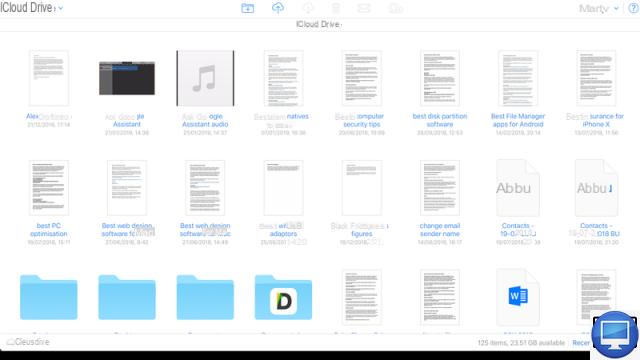
- Most
- Integration with Apple devices
- Automatic backups from apps
- The lessers
- Exclusive to Apple devices
- Only 5 GB offered
- Indicated price:
Apple's iCloud works a bit differently than other cloud services, as it's actually part of macOS and iOS. You can access it through Windows PCs, but that only really makes sense if you use it primarily with Apple devices.
Along with files, photos, and videos from your iPhone or iPad, your messages, calendars, contacts, and other data are also stored in iCloud.
The advantage of this system is that a large part of the operations takes place behind the scenes and you will never need to deal with it once the service is in place. Plus, when you switch to a new Apple device, you can instantly sync all the information from your old device in minutes.
Sure, iCloud's free 5GB isn't nearly enough, especially if you like taking photos and videos, but there are reasonable prices for extra storage...
Conclusion : If you only use Apple products, then iCloud deserves your attention.
8Box - Best for Business
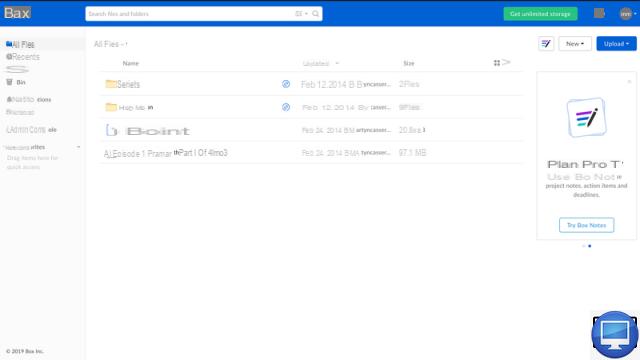
- Most
- Compatible with many platforms
- Good set of features
- The lessers
- Free users limited to 250MB files
- No version support
- Indicated price:
Although Box offers storage options for individuals, it is primarily aimed at businesses. Still, the free plan offers 10GB of space, though file size is limited to 250MB. This is fine for most documents, spreadsheets, and even high-res photos, but not videos.
The free account also does not support versioning (i.e. the ability to restore previous versions of a file), nor does upgrading to the Personal Pro plan, for 100 GB of storage space and a file size limit of 5 GB.
For businesses, there is a whole range of options, starting with the Starter plan, also 100 GB, a file size of just under 2 GB, the possibility of working with teams of 3 to 10 people, taking in charge of document encryption, etc.
Functionally, Box is very good. Desktop and mobile app interfaces (available on Windows, macOS, iOS, Android) are slick and well-designed, with plenty of options for creating, uploading, and sorting files.
Conclusion : For documents and photos, it's a good service, but the best experience is for business users.
9Amazon Drive - Best for Prime Subscribers
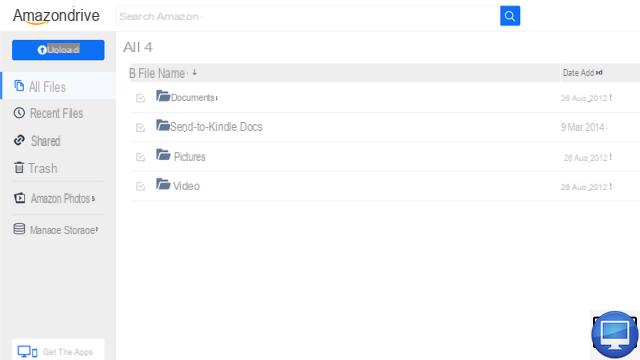
- Most
- Unlimited full-resolution photo storage with Prime
- The lessers
- Not suitable for other types of documents than photos and videos
- Indicated price:
Amazon Drive has had a name change and revamp over the past few years. It remains confusing, however, and isn't particularly easy to find on Amazon's website. You may wonder if Drive is part of Amazon Prime (it kind of is) or if you can sign up for it independently (it is). There's also a lot of confusion and overlap between the Amazon Drive and Amazon Photos apps, and there's no real syncing of files from desktop computers.
To be fair, Amazon markets it as a photo and video storage, although you can store and preview many other file types, such as PDFs and office documents.
Here is what it is:
Do you have an Amazon account? You have 5 GB of free storage for your photos and videos.
Do you have Amazon Prime? You get unlimited storage for photos and 5 GB for videos.
Do you have a Fire tablet? You get unlimited storage for photos taken with this device, plus 5GB of additional storage.
It should be noted that the mentioned unlimited storage is for photos at their original full resolution. Google has stopped offering unlimited free storage for "high" quality photos uploaded to Google Photos. However, we prefer the Google Photos app to the Amazon Photos app.
Conclusion : Amazon Drive is not the best cloud service, but it makes sense if you combine it with the other services offered by the company.
10Tresorit - The most secure
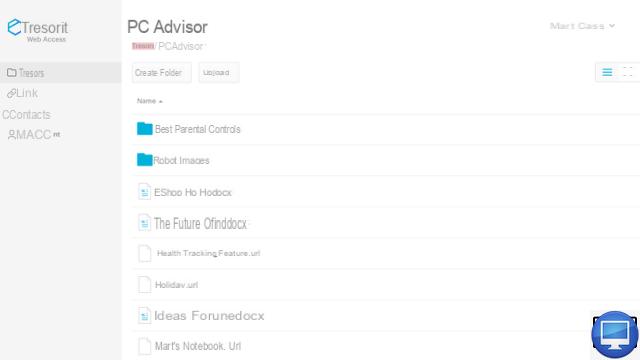
- Most
- Easy to use
- End-to-end encrypted zero-disclosure service
- The lessers
- Expensive
- Indicated price:
The Swiss company Tresorit takes security and privacy very seriously. It offers end-to-end encryption as standard, zero-knowledge authentication (meaning Tresorit doesn't know your password and can't access your data), multiple copies of files kept on multiple servers for backups, two-factor authentication, and EU-based servers so they benefit from strong privacy laws.
It is therefore a very interesting offer if you want to be sure that no one interferes in your affairs.
All these precautions are of course chargeable, but Tresorit offers a 14-day free trial. There's also a free tier called Tresorit Basic that lets you connect two devices and gives you 3GB of storage and up to 50 share links per month.
In reality, it is better to opt for the Premium formula at least, for 500 GB.
Solo is a plan for freelancers and professionals that includes 2,5TB of storage, password-protected file sharing, granular permissions, Outlook integration, and unlimited file versions (up from 10 for the Premium plan).
Tresorit now allows users to receive files in an encrypted environment without the sender needing to be subscribed. Additionally, there is a choice of "residency options" to choose where your data is stored, so local teams can store data on servers in their own region.
Desktop and mobile apps are available on Windows, macOS, Linux, iOS, and Android.
Conclusion : Although more expensive than other services, Tresorit will appeal to those who value security and privacy.
11MediaFire - Best for large storage capacities
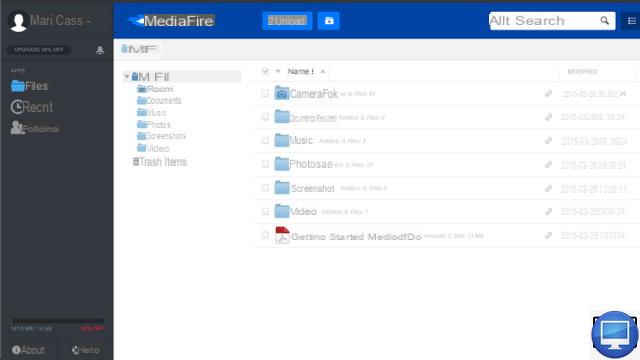
- Most
- Up to 50 GB of free storage
- Good for sharing large files
- The lessers
- Ads in the free version
- Indicated price:
MediaFire is an easy to use service, new users get 10GB of free storage to start with. This capacity can be increased to 50 GB by completing additional tasks such as referral by friends.
The service highlights the fact that its users will not be subject to bandwidth or download restrictions, which is made possible by the fact that Mediafire is ad-supported. If you decline this, or just want to increase your storage capabilities, there is the Pro tier which includes 1TB of space, the ability to download files directly from a website by pasting the link, downloads bundled and unique links to prevent people from sharing the files you have made available to them.
Conclusion : A good Cloud solution for an average user, with a good amount of storage space offered.
12Internt
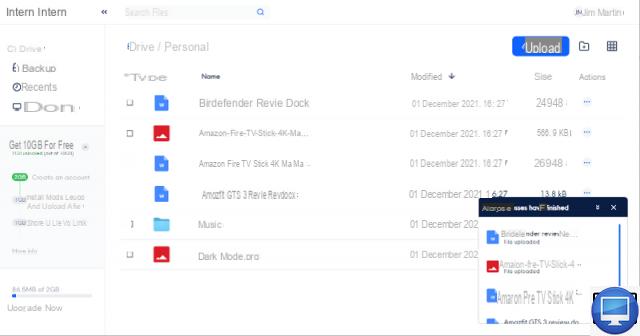
- Most
- Zero-Disclosure Encrypted Storage
- Value-priced lifetime plans
- The lessers
- Very basic functions
- No version or undelete
- Indicated price:
Internxt is one of the newer cloud storage services. It's basic, but has something its competitors don't tend to offer: full zero-knowledge encryption. Only you can access your files, and no one else. And these files are divided into fragments which are stored in a decentralized way, which protects them even more.
You can use Internxt for free, and you get 2GB as standard, with the option to upgrade to 10GB by downloading the mobile app, enticing your friends to sign up.
Other than downloading, file sharing, and syncing across your devices, it has few features.
Note that backups of specific folders and files to be backed up will not be deleted if you intentionally or accidentally remove them from your device.
The Photos app works much like Google Photos and syncs your photo library.
Conclusion : A safe service, but currently basic.
Recommended articles:
- The best SSDs and HDDs
- The best SSDs
- Best NAS Servers for Mac
- The best backup software for Windows
Related Content: Storage Tests











